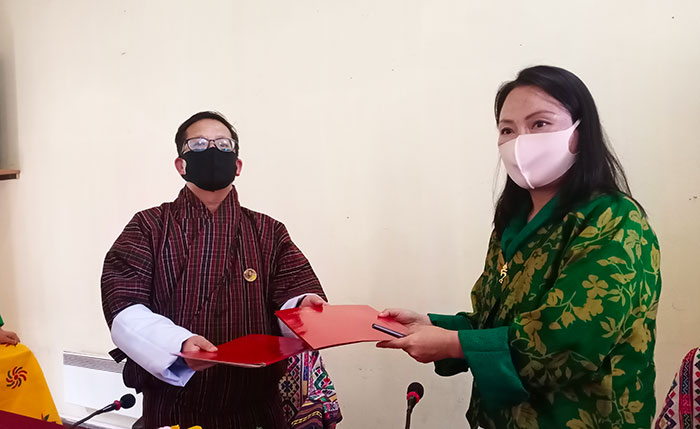Thinley Namgay
The Royal Institute of Management (RIM) and the Department of Local Governance (DLG) yesterday signed a memorandum of understanding (MoU) for the institutionalisation of LG capacity building efforts.
Training in the field of leadership, financial and human resource management and ICT, among others, are necessary for the local leaders as per the Training Needs Assessment (TNA) conducted by the Royal Institute of Management (RIM) since last year.
There are 21 training programmes listed in the TNA based on the surveys conducted with the local leaders of seven dzongkhags—Mongar, SamdrupJongkhar, Zhemgang, Wangdue, Samtse, Dagana, and Paro.
Stakeholders’ consultation, data collection, and data analysis have been completed. RIM is expected to focus on curriculum development following the stakeholders meeting.
Gup, Mangmi, Tshogpas from the 2021 election and the gewog administrative officers and Gaydrungs will get the capacity development training at RIM in 2022.
Head of the TNA team and lecturer at RIM, Sonam Peljor, said that the DLG had been conducting training for the local leaders but they were not well-structured. “There is a mixture of experienced and inexperienced local leaders. This collaboration will address this shortcoming and bring all of them together by giving the same training to enhance uniformity in service delivery.”
MoU was signed by the director of RIM, Sonam Pelden Thaye, and the director of DLG, Kado Tshering.
RIM and DLG will collaborate to conduct training needs assessment, development of case studies and course module for training programmes, capacity development programmes for LG functionaries, and research, seminars and conferences on local governance.
Sonam Pelden Thaye said that LG functionaries were term-based, “but competency requirement is the same throughout their tenure and training is a must. The terms of reference and the role and responsibilities are predictable. Complexity and nature of work change every year.”
As per the MoU, both the signatories shall seek to secure funds from the government to carry out the activities proposed in the MoU.
Kado Tshering said that RIM being a pioneer of leadership training institution, the standard of training would be promising. “There will be uniformity. Being an immediate service provider of the communities, the capability of local leaders is a must. Local governments also have the potential to address rural-urban migration and youth unemployment.”


